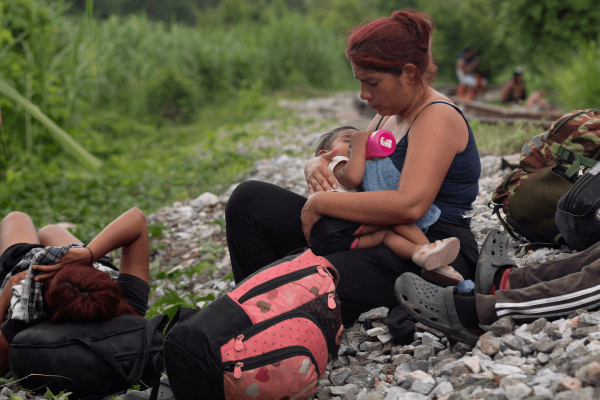If you want to understand who God is, then I think one of the foundational themes is the experience of migration.
God’s first house — the tabernacle — is movable, following the Israelites as they wander from Egypt to Canaan (Exodus 40:34; Numbers 1:47-53). The theme of migration continues into Jesus’ life, where Matthew’s gospel tells us that he fled political violence and spent much of his childhood in Egypt (Matthew 2:13-23). Even when he is back in his own country, he is unwelcome in his hometown and “has nowhere to lay his head” (Matthew 8:20).
In election season, we sometime ask whether God is a Democrat or a Republican, but the truth is more obvious: God is an immigrant.
As the presidential election cycle nears its conclusion, one issue has stood out to me as perhaps the defining issue of the campaign: immigration. In a country that thinks of itself as Christian, some 55 percent of people want less immigration, according to a recent Gallup poll. That number has grown by 14 percent in just one year. Both candidates have worked tirelessly to show that if elected as president, they’ll be “tough” on the border. Former President Donald Trump has promised “mass deportations” and peddled Far-Right talking points like remigration, the idea that immigrants should be sent back to their countries of origin. Vice President Kamala Harris has argued that she would be harder on the border than Trump and recently released a plan to further restrict asylum processing.
Not long ago, the two parties presented very different visions for how to address immigration in general but undocumented immigrants specifically. In 2012, Benita Valiz became the first undocumented person to address a major party convention. The Obama administration had just used its executive authority to create the Deferred Action for Childhood Arrivals policy which was a program meant to prevent deportation of those who had been brought here unlawfully as children. A majority of Republicans opposed DACA, and so the two parties became entrenched in their positions. Now, in 2024, it is difficult to distinguish between the Democratic and Republican vision on immigration generally and undocumented immigrants specifically, as both parties are mainly focused on tightening border security.
Democrats’ rightward shift on the issue of immigration has come to a head during this election cycle. For example, in June, President Joe Biden’s executive action created a quota system for processing asylum claims which require that the asylum seeker be in fear of their life or afraid for their safety in order to claim asylum in the first place. Not only that, but the Biden administration urged the removal of environmental considerations in its rush to build more of Trump’s border wall that it once decried as “ineffective.”
Trump’s rhetoric and plans are even more brutal and promise to usher in a truly hellish chapter in the nation’s history. At a recent rally in Pennsylvania, he again repeated lies about the Haitian community in Springfield, Ohio, as the crowd chanted “send them back!” Stephen Miller, a former Trump political advisor and immigration hardliner, argued last year that the National Guard will play a prominent role in deporting people if Trump is elected, even if it means deploying the National Guard to invade “unfriendly state[s]” that provide sanctuary to undocumented persons.
The increasingly hardline stances of both the Democrats and Republicans suggests that U.S. citizens have run out of goodwill, and that the asylum laws — which require a judge to at least temporarily grant asylum status to a person if they provide a credible reason for why they fear for their safety in their country of origin — don’t matter when we’ve decided that we are not responsible for asylum seekers and immigrants.
But there’s a problem with that. When we close ourselves off from immigration, we pretend that we have nothing to do with creating the conditions that led to migration from Central and Latin America in the first place, or think that our comfort is more important than the lives of others, we are not just closing ourselves off to compassion; we are closing ourselves off from experiencing God.
For Christians, the truth is quite simple: God is not vaguely in solidarity with the vulnerable, but actually is the vulnerable. Matthew 25 insists that whatever we do, or do not do, for the sake of those who are experiencing hardship, we do the same for Jesus. An underappreciated aspect of that chapter is that we are offered a direct line to God. I would go as far to suggest that this immediate access is not available through Christian worship or even prayer, but through our treatment of those whom society has disregarded.
As a pastor of a church in the New Sanctuary Movement — a movement dedicated to immigration reform, housing undocumented immigrants, and giving them a platform to speak — it’s part of my calling to ask for compassion for immigrants and asylum seekers; it’s what I believe our faith calls us to do. But it’s also a little more personal for me. My wife is a naturalized citizen, and my daughter was born in another country. When Trump talks about sending people back to where they came from, I can’t help but feel uneasy.
One of the things that I learned in my long journey to bring my family to this country is that our system is broken beyond repair. We had every privilege imaginable — we are white, we could afford a lawyer, we all spoke fluent English, and it still took us 18 months to complete the process. For people without those advantages, it’s much more difficult.
As a country, we have developed a compassion deficit. What’s worse is our political system has seemingly converged on this issue to offer us few alternatives. Republicans and Democrats basically agree that telling asylum seekers they are out of luck is the right thing to do, and a majority of U.S. citizens think the same. It will take courageous action from people of faith to change that opinion, but it has been done before, even in similarly nativist times.
In my book Sanctuary and Subjectivity, I outline the ways that the Sanctuary Movement of the 1980s took place in an atmosphere of similar rhetoric and antipathy toward immigrants, where society became obsessed with delineating between “economic migrants” and refugees. Times were bleak then too, with 49 percent of Americans saying they wanted less immigration according to Gallup. And yet, the movement won significant reforms in the asylum process, such as temporary protected status for Central American refugees, and it created a network of sanctuary cities, states, and campuses that remain active to this day.
People of faith have plenty on their plate this election cycle. My congregation has had a huge increase in election anxiety, for instance, but we cannot forget that our attention must be trained on God. In this case, that means pushing back against hateful rhetoric and the sorts of policies that have become commonplace from both parties this election cycle. When people speak poorly of immigrants, they are not talking about some distant other — they are talking about the God we purport to serve.
Got something to say about what you're reading? We value your feedback!







